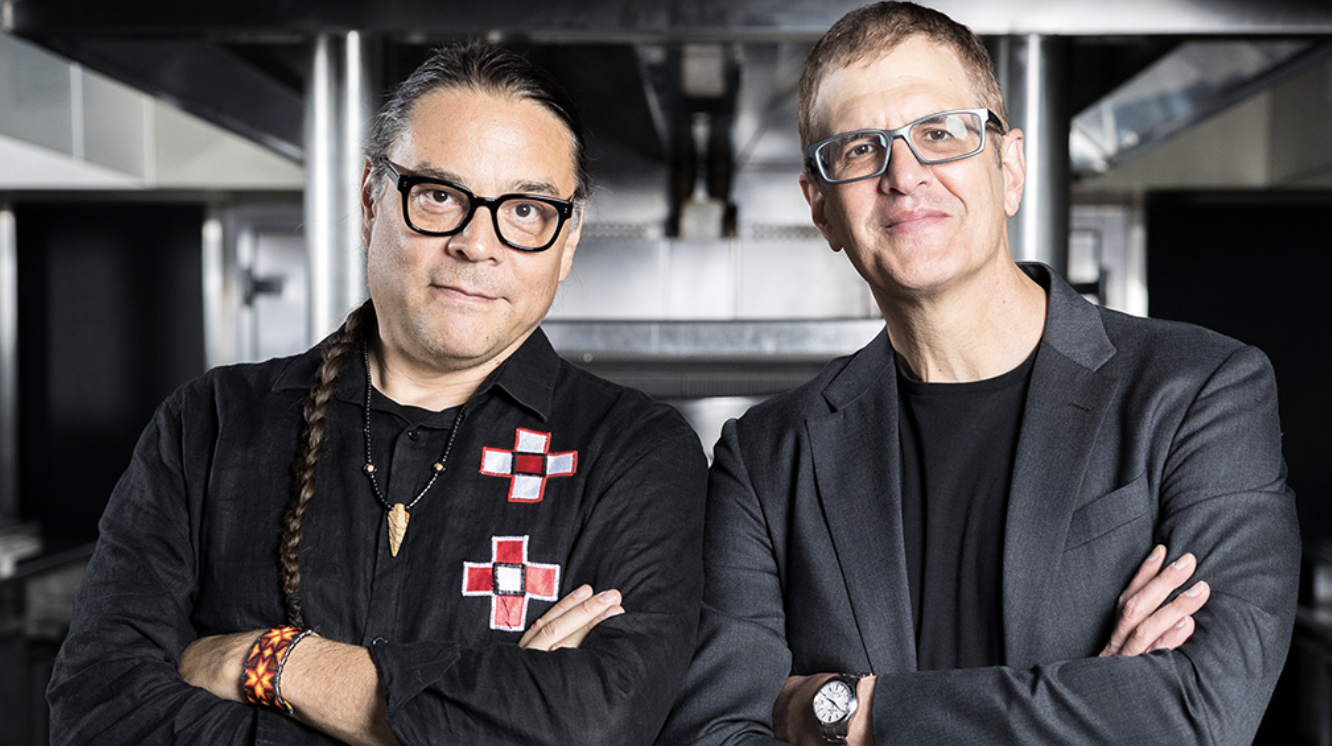
- Details
- By Shaun Griswold
“Owamni” is a Dakota word meaning falling water, and it is the name of Chef Sean Sherman’s James Beard Award-winning restaurant expanding along the Mississippi riverfront in downtown Minneapolis.
Sherman (Oglala Lakota) told Native News Online that Owamni will relocate in the spring of 2026 to take over the restaurant space at the Guthrie Theatre, the Twin Cities’ iconic performing arts center. There, he will continue to showcase Indigenous food sovereignty on the menu and through education resources directed by the North American Traditional Indigenous Food Systems.
“It's a bigger kitchen for us to do more stuff,” Sherman said. “We've been sold out every night since we opened. And this will enable us to feed more people. We still have a wait list every single week.”
Currently, Owamni can seat up to 80 people. The new setup will allow for up to 220 guests.
Brunch menus now include elk, huckleberry-cured salmon, corn cakes, and blue bread. Lunch and dinner include a mix of traditional produce options like yucca fries and hard-harvested wild rice. Meat options include fish, bison and lobster. Crickets and Popcorn is another protein option that includes roasted crickets, candied seeds and maple sumac popcorn.
The growth is all part of Sherman’s mission to expand spaces for Indigenous and non-Indigenous people to celebrate culture.
“We see using restaurants as a really resourceful tool to help food sovereignty come alive,” he said. “We are creating a massive workforce, because with one restaurant and one kitchen, we’ll have 130 employees.”
Owamni and its nonprofit partners at the North American Traditional Indigenous Food Systems are also in line with Guthrie’s mission to drive cultural resources along the riverwalk in Minneapolis.
“Our current building site was chosen more than 20 years ago for its meaningful connection to the river,” Guthrie artistic director Joseph Haj said. “This mission-driven, nonprofit collaboration reflects Guthrie's deep commitment to our community and to enhancing the vibrancy of the Mississippi riverfront in downtown Minneapolis.”
The space at the Guthrie Theater will give Owamni guests immediate access to theater performances in Minneapolis, both classical and contemporary. The theatre houses three state-of-the-art stages, production facilities, classrooms and dramatic public spaces.
“We're hopefully opening up the doors for more and more chefs to be inspired to work towards featuring some of our First Nations cuisine and pushing the limits of what can be done with it,” Sherman said. “And we're seeing a big movement out there with Indigenous food sovereignty with not only producers and education, but also, we are seeing a lot more, culinary projects starting to appear kind of all over the country.”
More Stories Like This
Watermark Art Center to Host “Minwaajimowinan — Good Stories” ExhibitionMuseums Alaska Awards More Than $200,000 to 12 Cultural Organizations Statewide
Zuni Youth Enrichment Project Takes Top Emerging Artist Apprentices to Phoenix for Artistic Exploration and Cultural Immersion
From Dishwasher to Award-Winning Chef: Laguna Pueblo's Josh Aragon Serves Up Albuquerque's Best Green Chile Stew
Rob Reiner's Final Work as Producer Appears to Address MMIP Crisis
Help us defend tribal sovereignty.
At Native News Online, our mission is rooted in telling the stories that strengthen sovereignty and uplift Indigenous voices — not just at year’s end, but every single day.
Because of your generosity last year, we were able to keep our reporters on the ground in tribal communities, at national gatherings and in the halls of Congress — covering the issues that matter most to Indian Country: sovereignty, culture, education, health and economic opportunity.
That support sustained us through a tough year in 2025. Now, as we look to the year ahead, we need your help right now to ensure warrior journalism remains strong — reporting that defends tribal sovereignty, amplifies Native truth, and holds power accountable.
 The stakes couldn't be higher. Your support keeps Native voices heard, Native stories told and Native sovereignty defended.
The stakes couldn't be higher. Your support keeps Native voices heard, Native stories told and Native sovereignty defended.
Stand with Warrior Journalism today.
Levi Rickert (Potawatomi), Editor & Publisher

